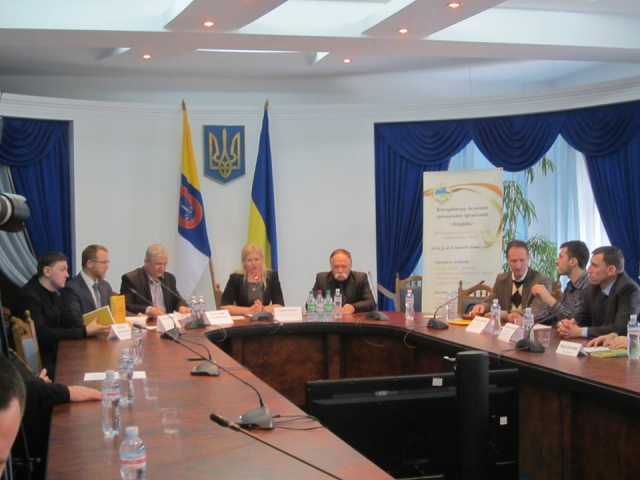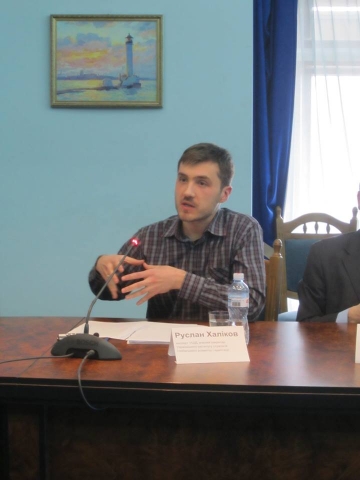On March 24, Odesa hosted the international scientific conference, dedicated to the 350 th anniversary of the research mission-travel throw the lands of the southern regions of Ukraine and Crimea, made by Turkish historian and geographer, Evliya Çelebi.
At the invitation of the organizers of the event — AUSO "Alraid" and the Ukrainian Center for Islamic Studies, the leading scientists, public and religious figures got together in the conference hall of the Odesa Regional State Administration. They gathered in order to value the contribution of the Ottoman researcher to the History and to consider the challenges, facing not only science and education, but also Ukraine, the full-fledged player in the geopolitical arena. Particularly, those present focused on the issue of external relations of our country and the countries of the East.
The event was attended by the expert of the Ukrainian Center for Islamic Studies, the scientific secretary of the Ukrainian Institute of strategies of global development and adaptation, Ruslan Halikov. He noted in his landmark report on the relations between Ukraine and Turkey, that the current rapprochement between our two countries caused by external factors, i.e., it has a tactical and casual character:
— But this convergence is quite expected in the context of the formation of several regional influential centers, which are aspiring to influence on the global dimension. First and foremost, there is the development of transnational trends in the Middle East and the former Soviet Union. There are three influential globalization projects in the Middle East, for the second half of the 2010s, that claim to the leadership in the Islamic world: Turkish, Arabic and Persian. The first and the third ones received the active government as the tool for applying its doctrine and began fighting for the regional priority with the prospect to become the leader of the Islamic world.
The competition within the Islamic civilization is apprehended by the participants as seriously as the competition with the West, and, sometimes, local and regional conflicts are more important, so the sides are ready to join forces with extraregional partners for the purpose to win. Thus, Turkey is an active member of NATO and Iran, since 2015, has begun to actively build relationships with the EU and the United States.
According to Ruslan Halikov, the both projects also turn to non-Western partners. In particular, during 2015 and early 2016, Iran devoted much attention to the collaboration with the Russian Federation. Turkey also expressed its support to Ukraine:
— Thus, Putin undertook the strategic visit to Iran in autumn 2015, as well as Poroshenko visited Turkey in spring 2016. The diplomatic and military cooperations between each pair of countries are continuing. However, today it seems that both directions are rather tactical than strategic ones, and are considered by the Middle East players as the seeking the potential satellite rather than the real amplification in its own status. The post-Soviet countries are also important for the Islamic globalization projects as the area for missionary activities, because the religious identity of Muslim nations has become rather amorphous in these areas, as a result of the decades of the forced secularization. And after the collapse of the Soviet Union, the religious activity has increased significantly, so, there is a demand for the missionaries to recover Islamic tradition, — said Ruslan Halikov.
The expert noted that despite the situational partnership with Turkey, Ukraine can receive a considerable backing from the economically developed state with the powerful army. In addition, an important bonus for Ukraine, probably, will be the improvement in the relations with the Patriarchate of Constantinople that depends on the official position of Ankara in its political steps.
— At the same time, becoming a partner of one of the globalization projects, we must be ready to provide the support to him, in case of the regional conflict, which is not directly related to our state. Russia actually felt it, which is forced to support the pro-Iranian line in Syria, de facto creating with Iran the alternative to the Western coalition. She had spent a significant amount on the military operation and was subjected to retaliation by the jihadists. For its part, Ukraine, as a Turkish partner may be threatened in its territory by the anti-Turkish Kurdish forces (who also cooperate openly with Russia recently). It is known that Ukraine was entered in the "black list" by the representatives of the "Islamic state", despite the fact of its passive role in the Western coalition — said Halikov
But, it is clear that a conscious strategic partnership of the two states can provide more benefits than situational and sporadic one. That’s why, it is necessary to find more reliable point of intersection than the interim political situation. It is important to rethink the overall history, because the stereotype of Turkey as a foreign country in civilization aspect and the historic enemy still exists. Such reputation has been built against Crimean Tatars in Soviet times, and it is still common in everyday reflection of Ukrainians. Of course, the demonstration of many historical episodes about the cooperation with Ukrainians (in particular with Ukrainian Cossacks after Zaporoz'ka Sich had been demolished) will help to harmonize the common historical memory and to create the image of Turkey as a partner and a friendly culture.
Ruslan Halikov stressed that we should be interested not only in the political history but also in the history of culture, in order to see the points of the intersection in language, cuisine, cloths and so on, and then translate the results of these findings into the language of mass culture.
— An interesting example of this trend is the rock festival "Danube Sich", which has twice held in the Ukrainian city, Izmayil. Thanks to such music festivals, films on historical themes and other activities, it is possible to promote a positive image of Turkey among Ukrainians.
“The researches in the field of Ukrainian-Turkish relations are also referring to such cooperation at this level”, — said Ruslan Halikov in his report:
— For example, the project of the publications of the works by Muslim philosophers and scientists, who lived on the territory of modern Ukraine, is very important. Also it would be reasonable to make the bilingual edition of those parts of "Seyahatname" ("The Travel Book") by Evliya Çelebi, which tell about his staying on the territories that are now parts of Ukraine, in particular, Crimea and the southern region. Actually, the existence of such historical evidence, as "The Travel Book", may be the illustration of the fact that today we do not construct memories, but we really focus on the historical memory, which will help to establish good neighborly relations and to transfer the cooperation of Ukraine and Turkey on the strategic level.



